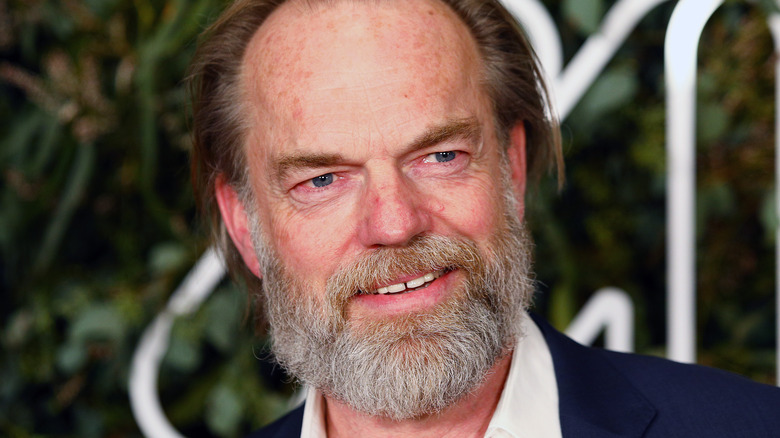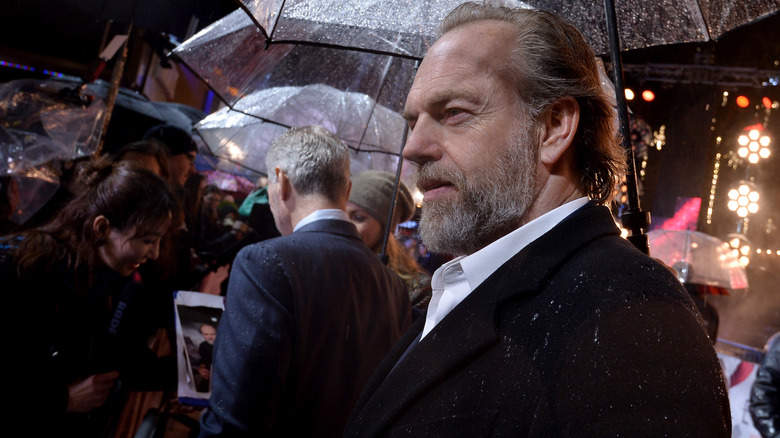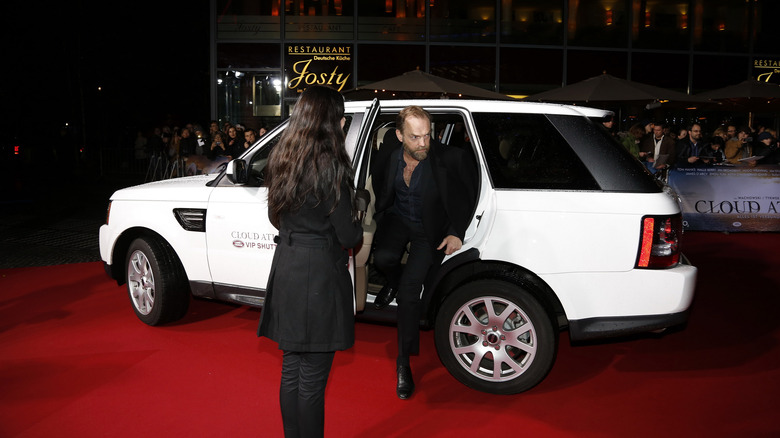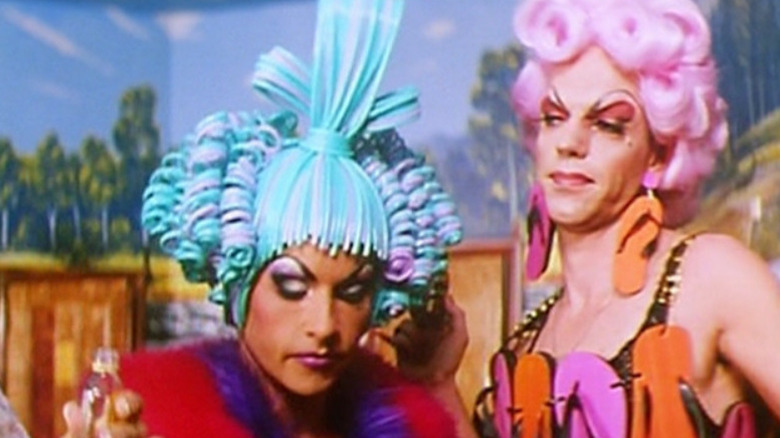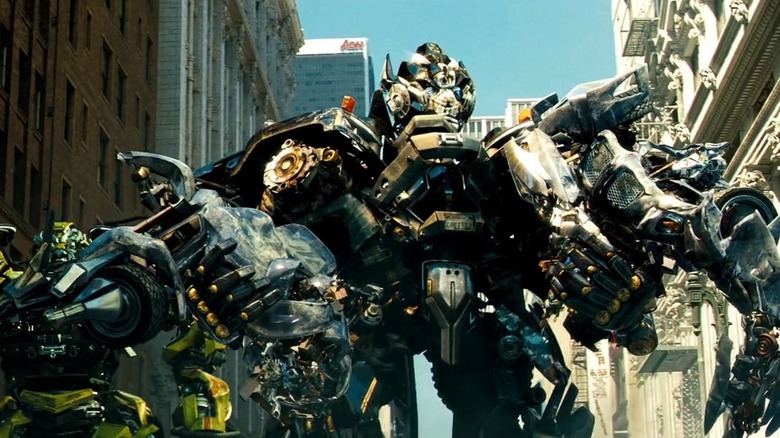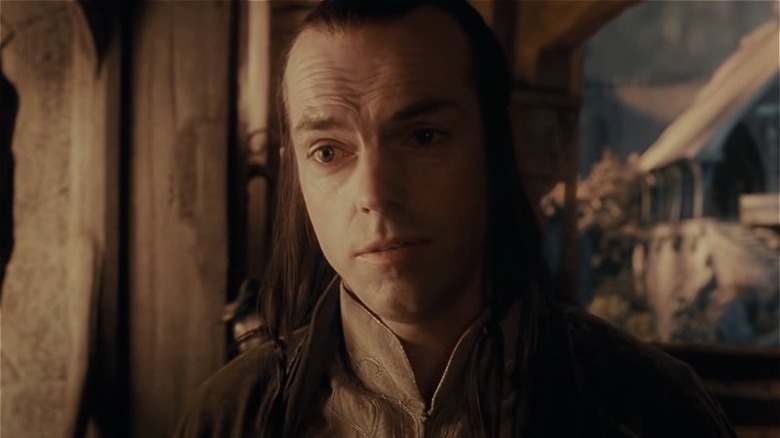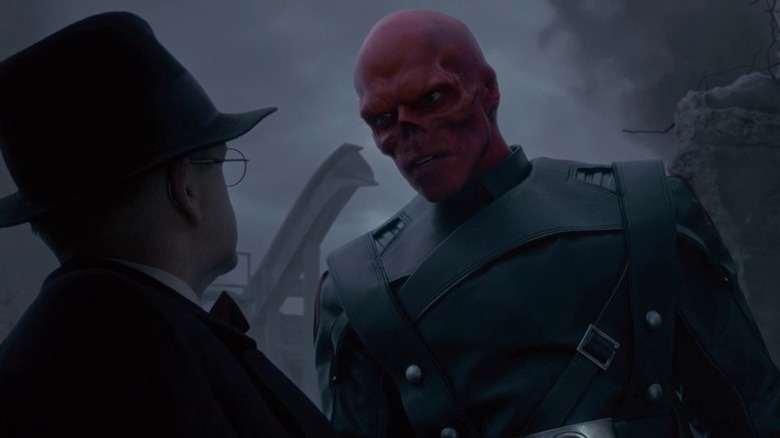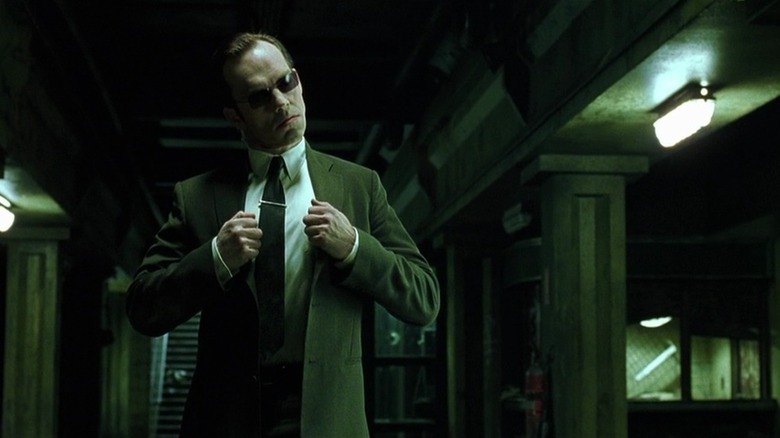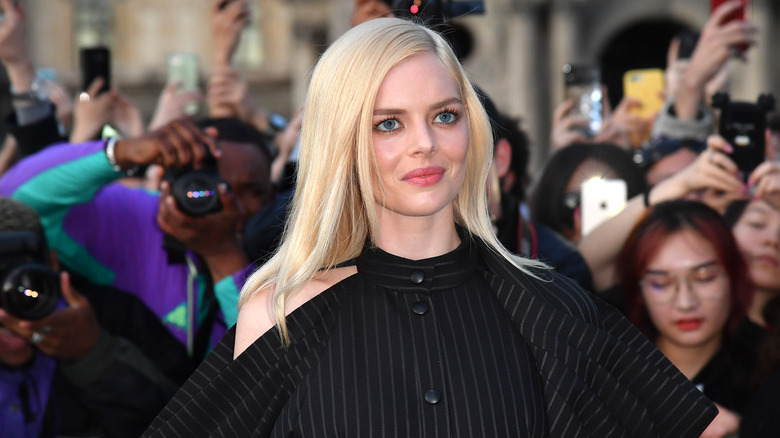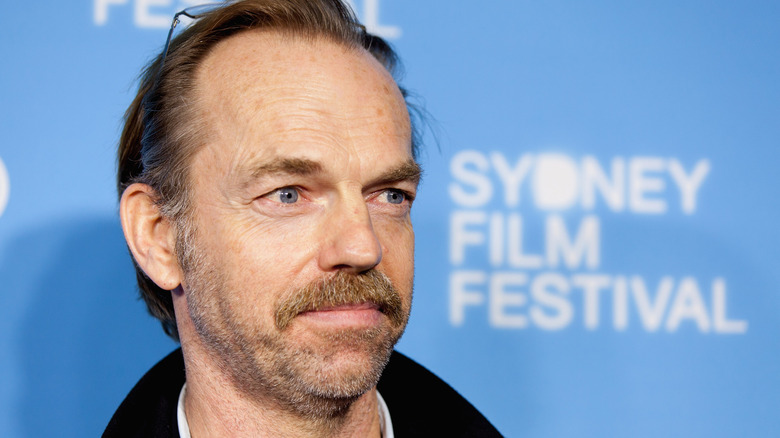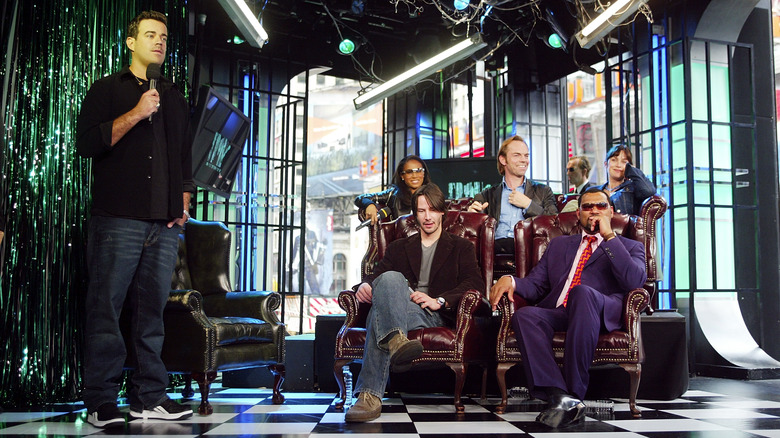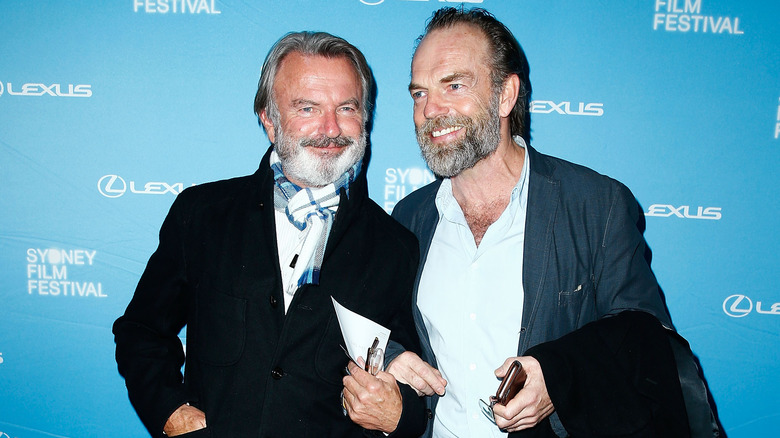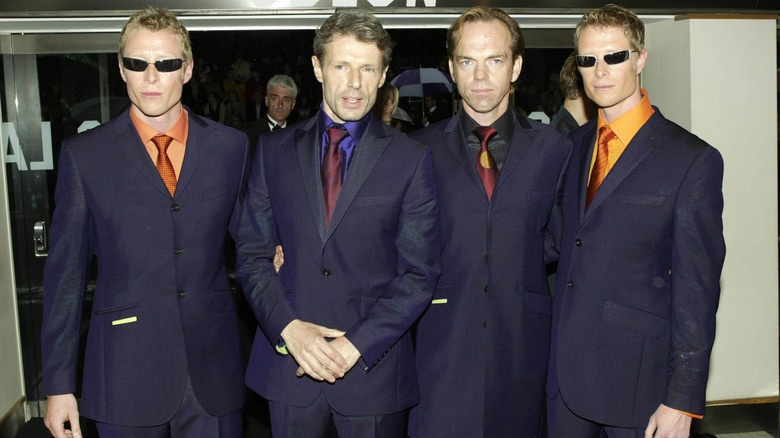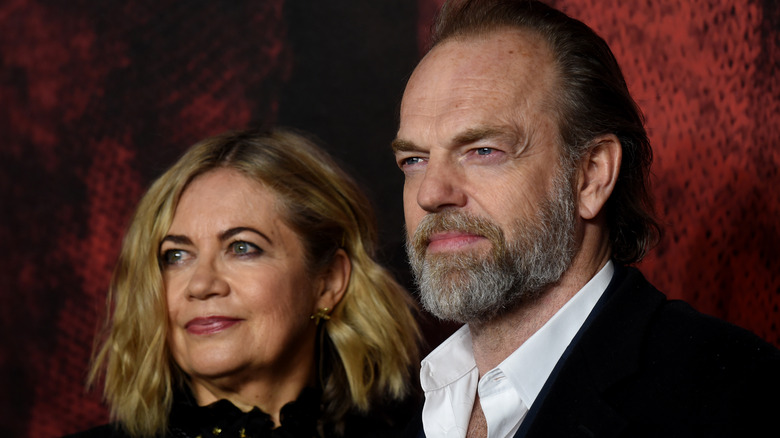The Untold Truth Of Hugo Weaving
When it comes to playing forceful characters with commanding voices and an air of deep gravitas, Hugo Weaving has one of the most impressive resumes in Hollywood. After a string of well-received roles in small movies, Weaving made pop culture history as Agent Smith in "The Matrix Trilogy," a rogue AI with a sardonic sense of humor and a palpable sense of menace.
After that, Weaving joined another iconic franchise as Elrond in Peter Jackson's "The Lord of the Rings" films and later "The Hobbit" series. The actor also proved he could carry a leading role using only his voice and body language when he suited up as the anti-hero V in 2006's "V for Vendetta."
In a career spanning more than three decades, Weaving has proven himself remarkably adept at straddling the worlds of blockbuster cinema as well as smaller, indie fare. Despite appearing in some of the most popular movies of all time, the actor remains a very private individual in his personal life. Let's draw the curtain back a bit on the life and times of Hugo Weaving, and trace his journey from the streets of Nigeria to the world stage.
Growing up all over the place
Hugo Weaving has repeatedly proven himself to be skilled at using different accents, from American to British and German. One reason for the actor's comfort with different modes of pronunciation is his childhood, which was spent hopping from one country to another and growing up in all sorts of different cultural milieus.
Per TCM, Weaving was born to British parents on April 4, 1960, in Ibadan, Nigeria. His mother, Anne, worked as a tour guide, while his father, Wallace, had a career as a seismologist. From there, little Hugo was taken to the UK by his family. After some time, they moved once again, first to Melbourne and Sydney in Australia and then to Johannesburg in South Africa. Finally, Hugo returned to the UK a second time.
According to The Sydney Morning Herald, he attended The Downs School just outside of Bristol. From there, he bounced off to the Queen Elizabeth Hospital School, where he first started taking an interest in acting after appearing in a few plays. After his family moved to Australia once again, Weaving continued to stick with acting, and he graduated from Sydney's National Institute of Dramatic Art in 1981.
He cannot drive a car
One thing that differentiates Hugo Weaving's characters from run-of-the-mill villains is that they often get physically involved in the conflict instead of relying on henchmen. Agent Smith personally fought Neo in each installment of "The Matrix" films, and Weaving's Red Skull in "Captain America: The First Avenger" threw down personally with Cap in a no-holds-barred fight.
While Weaving has shown his skill at pulling off elaborate action scenes, there is one genre of stunts that he cannot perform, which is anything to do with cars. And that is because Weaving has never driven a car in his life. The actor had epilepsy at an early age. "I probably had one major [epileptic] seizure a year," Weaving told the New York Post. "Every now and then I'd fall down and wake up to someone saying, 'Are you OK?', but it never affected any jobs I was doing."
While the actor was able to perform his day-to-day physical functions without cause for concern, he noted that "I don't drive as a result [of the epilepsy], because I couldn't get my license." Weaving also revealed that he has not had a seizure in the past 18 years but has now lost the will to get a driving license, humorously adding, "I can't be bothered. It's easier to walk. At least, that's my excuse, anyway."
Starting out as a drag queen
Today Hugo Weaving is best known for playing a host of characters with a lot of gravitas, many of whom are singularly lacking in a sense of humor. But Weaving himself has never taken his position as an actor too seriously, and has enthusiastically experimented with a variety of roles that many actors might still hesitate to take on today.
The actor's first television role was in the 1984 Australian television series "Bodyline." From there he steadily built up a reputation as a character actor with a string of well-received performances. But the role that first put Weaving on the map was as drag queen Anthony "Tick" Belrose/Mitzi Del Bra in the 1994 film "The Adventures of Priscilla, Queen of the Desert."
Weaving went all in on his role in the film, and the result was a smash hit worldwide, resulting in an Oscar win for Best Costume Design. The actor still has fond memories of his time playing Anthony Belrose. He also expressed his willingness to be a part of a sequel. "We had ideas at the time [for the sequel]," Weaving told Gay Times. "Come on, my idea was that the girls should build a space rocket and we were trying to go to the moon."
The only part he never cared for
Over a long and illustrious career, Hugo Weaving has been a part of many projects, both big and small. The actor's passion for his craft is evident in all his onscreen appearances. But sometimes, an actor works for the paycheck — not for the artistic value of the project. In the case of Weaving, that time came when he was asked to voice the evil Megatron in Michael Bay's "Transformers" movies.
While everyone agreed that Weaving nailed the voice of the transforming robot, the actor himself was largely indifferent to what he was being asked to do. "It was one of the only things I've ever done where I had no knowledge of it," Weaving told Collider (via The Guardian). "I didn't care about it, I didn't think about it. They wanted me to do it. In one way, I regret that bit. I don't regret doing it, but I very rarely do something if it's meaningless. It was meaningless to me, honestly. I don't mean that in any nasty way."
They were strong words, and it's little wonder that Bay himself took offense at Weaving's statement and fired back at the actor. But despite his clear lack of interest in "Transformers" lore and his part in it, fans still love the menace and gravitas Weaving was able to weave into Megatron's voice that turned the hulking mass of alien metal into a memorable villain.
No more Elrond
After the stratospheric success of "The Matrix," Hugo Weaving was in grave danger of being typecast as the smarmy villain character. Fortunately, the actor soon afterward accepted a very different role in an equally influential franchise, Peter Jackson's live-action retelling of "The Lord of the Rings."
Weaving played the role of Lord Elrond, one of the high elves who was present during Isildur's initial defeat of the dark lord Sauron, and many centuries later advised the Fellowship of the Ring on their mission to defeat Sauron once and for all. Weaving reprised his role as Elrond in "The Hobbit" prequel movies but now appears to have had enough of the character. "No, I would never — I'm not interested in that at all," the actor told Variety in 2020 in no uncertain terms when asked if he would ever play Elrond again.
"Look, I loved being in New Zealand with all those great people," he continued. "and it was like going back to a family but actually, to be honest, I think everyone had more than enough of it." Perhaps Weaving's response had something to do with the mixed reviews "The Hobbit" movies received. In any case, as of this writing, we will probably get a new, younger version of Elrond in the upcoming adaptation of J.R.R. Tolkien's Middle-earth stories on Amazon.
Playing a different kind of Nazi
Hugo Weaving's turn as the Nazi supervillain The Red Skull in "Captain America: The First Avenger" is one of the oddest entries on the actor's resume. While Weaving is generally known for imbuing the most one-dimensional villain with some semblance of humanity, Red Skull is so over-the-top evil as to almost seem like a caricature from a World War II propaganda film.
As it turns out, it was this same excessively evil quality that attracted Weaving to the character. "The whole idea of playing a Nazi was hilarious," the actor told The Sydney Morning Herald. "because it was one of those, when you're a young actor, you go, 'I'm sure one day you'll end up in a German uniform, pretending to be a Nazi." Weaving went on to note that he enjoyed Red Skull's transformation from one of Hitler's lackeys to "suddenly he was an uber, uber Nazi who thought Hitler was an absolute nothing."
After a long absence from the MCU, The Red Skull made a comeback in 2018's "Avengers: Infinity War," this time being played by Ross Marquand. Weaving explained his absence from the role as basically an issue with payment. "[The producers of Infinity War] said: 'It's just a voice job, it's not a big deal,'" the actor explained to Time Out magazine. "I actually found negotiating with them through my agent impossible. And I didn't really wanna do it that much. But I would have done it."
Bringing back Agent Smith
The original "The Matrix" film is generally considered one of the most influential movies ever made, something that redefined Hollywood's approach to both action and sci-fi, and proved that complicated questions about identity and consciousness could be communicated via slick fighting sequences and gun-fu montages.
Naturally, the advertisement industry was quick to jump on the movie's iconic characters and settings to promote their products. In that capacity, Hugo Weaving reprised his role as Agent Smith for an ad for General Electric. Smith and his many doppelgangers take center stage in the ad as he declares, "I have found software that intrigues me. It appears it's an agent of good."
For the rest of the ad, Smith explores the benefits of interconnected medical hardware while hilariously staying in character as a malevolent AI. According to General Electric, this was the first time the Wachowskis licensed out plot points from "The Matrix" for advertising. If only they had found a way to include bullet time in the ad as well.
Uncle to Samara Weaving
Hugo Weaving is best known for playing characters that seem to exist outside of regular space and time, from Agent Smith to Elrond to V. But behind all those characters there is a regular guy who lives a regular life, and has friends and family like any other person. One such family member is his niece, actress Samara Weaving.
The younger Weaving has carved out her own niche in Hollywood playing badass movie heroines in such hits as 2019's "Ready or Not," and 2017's "The Babysitter," and playing Alex Winter's daughter in "Bill & Ted Face the Music" (2020). But years before delivering such hits, a very young Samara's first introduction to acting was watching her uncle's films, and the experience left her more confused than intrigued.
"It was 'The Adventures of Priscilla, Queen of the Desert,'" the actress revealed to Birth.Movies.Death. "An Australian classic, and he's in drag for most of it. I think I was 12 when I saw it, and I was like, 'Why is Uncle Hugo wearing a dress?' [Laughs] 'He's an actor, that's what he does!' That was very funny." The two Weavings appeared together in the 2013 Australian film "Mystery Road."
Commitment to Australia
Despite having starred in so many Hollywood blockbusters, Hugo Weaving continues to reside in Australia and is deeply involved in the country's entertainment industry. This has been a conscious choice on the actor's part, going against the trend of his contemporary Australian actors like Russell Crowe and Nicole Kidman, making Los Angeles the base of their operations after making it big in Hollywood.
"I suppose my interests have always [laid] with [Australia]," the actor admitted to Variety. "and trying to find really interesting projects out here. That's my primary focus." While most fans know Weaving for his big-budget roles, they are actually a small part of his extremely long resume, most of which consists of parts in small-to-mid-budget projects that foster homegrown talent.
Aside from films and television, the actor is also an ardent supporter of Australia's theater scene and has been a member of the Sydney Theater Company for decades. In fact, Weaving led the charge in the return of the company to stage productions after months of enforced inactivity following the global lockdown of 2020.
Playing with his action figures
One side effect of playing so many popular characters in immensely successful franchises is your face gets plastered on all sorts of merchandise. Hugo Weaving has been a part of this trend ever since "The Matrix" and "The Lord of the Rings," when he returned to voice Agent Smith and Elrond respectively in the films' spinoff video games.
There are other aspects of merchandising that do not even require Weaving's active participation. Like the action figures made in the image of his most popular characters. Weaving himself is in possession of some of those action figures, and cannot resist occasionally bringing them together for epic imaginary battles.
"I have action figures of Elrond and Agent Smith and occasionally they have fights," the actor has stated (via Contactmusic.com). "But ultimately Elrond wins, because he's so wise." You have to wonder how the balance of power would tip in those battles if Weaving were to include Red Skull and V in the mix.
Joining Sam Neill in the bathtub
Hugo Weaving is known for being a rather private individual who shuns the spotlight when not promoting his films, and does not engage with social media too much. But the 2020 lockdown forced the entire world into hiding, and social media became the only safe method of connecting with humanity at large.
Many actors took this time to up their social media game. One such actor was Weaving's close friend and "Jurassic Park" star Sam Neill. Confined to his own home, Neill had made a habit of releasing comic "micro-films" on social media to entertain fans. One such micro-film was "Das Bad," which had Weaving dropping in.
The short begins with Neill having a peaceful time in his bathtub. But the peace is destroyed when he realizes Weaving is also sitting in the tub at the other end. What follows is a hilarious minute of Weaving playing with a rubber duck and vigorously scrubbing his body with Neill's soap while the other actor tries to look anywhere but to the front. Imagine the amount of fanfiction the micro-film would have spawned if Weaving had worn his "Elrond" elf ears, and Neill had been replaced by Ian McKellen wearing his Gandalf hat.
Almost becoming Smith again
"The Matrix" fans were excited to learn that the franchise would be getting a fourth installment in 2021 that would see the return of Keanu Reeves and Carrie-Anne Moss as Neo and Trinity. The character of Morpheus is also making a return, although this time he is played by Yahya Abdul-Mateen II.
One cast name that is conspicuous by its absence is Hugo Weaving. It wouldn't feel quite like a "Matrix" movie if Neo does not square off against his arch enemy Agent Smith in some capacity. As it turns out, Weaving feels the same way, and he was quite willing to return to the franchise for the fourth movie. "I read the script and got an offer to my agent," the actor explained in an interview with Collider. "I immediately responded yes to that, and then we went into negotiation."
Unfortunately, things fell apart before Weaving could don his iconic suit and glasses once again. "I was doing a play, at the time," the actor continued. "but we were working out dates and things so that I could do both. And then, [director] Lana [Wachowski] decided that she didn't wanna change her dates, so I couldn't do it."
He's never been married
Hugo Weaving presents a curious case of matrimony in Hollywood. While so many of his contemporaries go through life partners like Gandalf going through fresh hobbits to send on deadly quests, Weaving himself has been in a committed relationship with the same person, Katrina Greenwood, for the past three decades.
According to The Sydney Morning Herald, the actor first met Greenwood when they were both children, although they were not friends at the time. In the mid-1980s, Greenwood moved into a building with her then-boyfriend where Weaving was already living with his then-girlfriend. Those relationships did not end up working out, and Weaving and Greenwood started dating each other. Despite having been together for more than three decades and raising two children, Weaving has no desire to make things official with Greenwood with a marriage license.
"You do or you don't know know whether your relationship is solid," the actor explained to Stellar magazine (via the Daily Mail). "And even if you think it is and you get married, that doesn't mean it is... So you have to work on it either way." No matter how unusual Weaving and Greenwood's take on marriage is, the arrangement is clearly working out a lot better for them than so many broken-up couples in Hollywood.
He wants people to get the message of his films
The movies that Hugo Weaving is most well known for have become an indelible part of the modern cultural zeitgeist. As happens so often with the most popular movies, their scenes and dialogs can get co-opted by the wrong crowd to send the wrong message. And Weaving is strongly opposed to such practices.
The actor confronted such malicious occurrences in strong words during a 2020 interview. "There was a group at the Black Lives Matter protest that were up against [the BLM protesters] with their guns," the actor told EW. "And two or three of those guys were wearing 'V for Vendetta' masks, and I was like, 'Wow, man. That couldn't be more the opposite of what it stands for!'"
Similarly, Weaving and the Wachowskis have publicly denounced illiberal forces from making use of scenes from "The Matrix" to attack their opponents or justify violence. According to Weaving in the same interview, assigning such destructive values to his movies is "a very, very shallow reading of the intention of a film."
